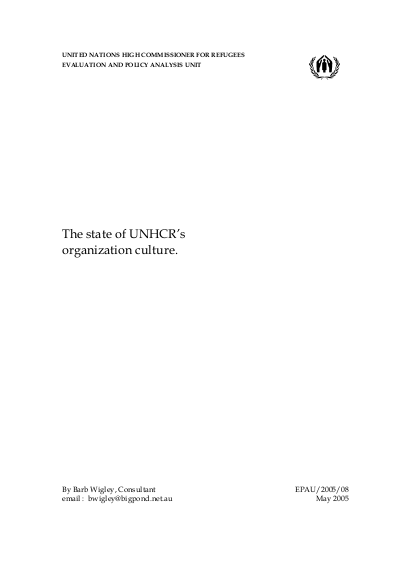
“The State of UNHCR’s Organization Culture” is the report of a research project undertaken in collaboration between the Staff Development Section and the Evaluation and Policy Analysis Unit of UNHCR, and the University of Melbourne in Australia. The study was developed independently of any other existing processes or reviews and the data was primarily gathered between November 2003 and April 2004. The report essentially argues that the culture and climate of this organization have a significant impact on organizational performance and outcomes. Organization culture consists of commonly held overt and unspoken assumptions or understandings that are learned and passed on to new members and which serve as guides to acceptable and unacceptable perceptions, thoughts, feelings and behaviours. Organization climate refers to employees’ perceptions about the way in which their workplace functions, including their experience of, for example, leadership and managerial practices, key policies, interpersonal dynamics and communication, and the emotional tenor of the workplace. With a specific focus upon these elements, the research analysed a wide range of organizational issues from the perspective of their interaction with organization culture, climate and dynamics. Taking this perspective as the central theme, it should be noted that the report does not set out to provide a definitive assessment of the organization as a whole; for example, it does not provide analysis of operations from a technical, financial or political standpoint, although these factors are considered in as much as they infuence or are influenced by organizational culture and climate. Through the discussion and analysis, the report emphasises that lack of attention to cultural factors ensures limited success in any change endeavours, lowers organizational morale and reduces the overall effectiveness of the organization. The research was conducted utilising a qualitative approach in line with established methodology in the research of culture arising from anthropology and systems psycho-dynamic frameworks. It draws upon ethnographic, in depth interview and participant observation techniques, along with some documentation review. The rigor of the approach lies in the number of people participating in individual or group interviews (over 100), the length of time spent immersed in the organization (around five months in the data gathering phase and a further three months validating the findings) and the number of country operations visited (13, including HQ). A number of staff assisted in the development and refinement of the final report by providing responses to their reading of the first drafts, which were subsequently incorporated into the final product.